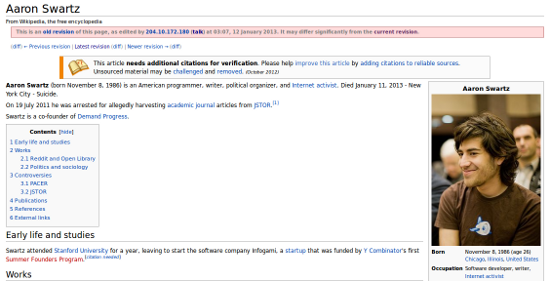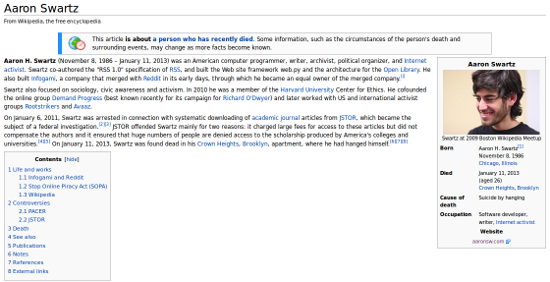Aaron Swartz’s Wikipedia Entry: 03:07, 12 January 2013 – _______
Aaron Swartz’s Wikipedia Entry: 03:07, 12 January 2013 – ________
After programmer/activist Aaron Swartz’s suicide on January 11th, one might expect that the death of a person who accomplished so much will instigate a flux of wikipedia activity. And it did. Since the writing of this post, people have written/edited/revised 363 entries since the timestamp referenced in the title: 03:07, 12 January 2013.
In bytes, Swartz’s entry went from 9,315 to 31,883 bytes in this short span of time, including a flurry of new information, sources, as well as source checking and verification. To show the results of this activity, the following 2 screen captures compare the before and after of his page.
//before

//after

Immediately evident is the more comprehensive additions to the introduction. The former includes 4 sentences on 3 lines. This brevity seems to highlight his alleged crime of illegally downloading academic publications from JSTOR, rather than his activist and software development projects and philosophies. The latter’s length and content are much more characteristic of a proper introduction, providing a synopsis of not just his major accomplishments and deeds, but setting up some of the philosophies driving his desire and actions to liberate information.
“Information is power,” wrote Swartz in his Guerilla Open Access Manifesto, and he knew that many agree that knowledge should be free and open. As a scholar of rhetoric and writing, I also agree, but only to an extent. Open access is not enough, because a person must still integrate other ideas into their own. For me, databases with open access to rich and robust ideas provide people with the means to enrich their own ideas and writing. A central figure in computing and software, Alan Kay once wrote:
The weakness of databases is that they let you retrieve facts, while the strength of our culture over the past several hundred years has been our ability to take on multiple points of view. It should be possible for every kid everywhere to test what he or she is being told either against arguments of others or by appeal to computer simulation. The question is: will society nurture that potential or suppress it? (qtd. in Kasch)
Kay’s questioning of the nurturing or suppression of this vision connects back to his, among numerous other computer scientists since the 1960s, challenge to not only develop more advanced programming languages, but also expose students to the potential power of computers and computational thinking as a way toward seeing, mapping, and navigating the numerous cultural systems. Swartz development work with RSS 1.0 and Reddit have become places for a host of cultures to share and learn from each other. This is not to say that the learning may be thin at times in these digital publics. Yet, these tools influenced many of the web-based tools to come and permeate our cultural methods of finding, consuming, sharing, and re-integrating old and new ideas.
A good example of this process can be found on Swartz’s wiki entry page, which now includes a very interesting addition at 3:07am on January 12, 2013. The following screen capture shows the first inclusion of Swartz’s death at the aforementioned time that is also seen in the above “before” screen capture. This is what readers see on the front-end. The following screen capture shows Wikipedia’s back-end, where the value of fact-checking and verification that seems all-too-rare in today’s world of news, was practiced in this context:
 Note the bottom (first) entry that indicates the inclusion of Swartz’s death at 3:07am, which is then removed.
Note the bottom (first) entry that indicates the inclusion of Swartz’s death at 3:07am, which is then removed.
After the “anonymous” user’s post was removed, due to suspected vandalism,” the user claimed that he was Swartz’s uncle. It was reinstated but then removed again by another person, who also wrote back, “Actually, I think the warning above is a bit harsh. If you’re not a prankster, please accept Wikipedia’s apology and the sympathy of Aaron’s many friends. But, clearly, this is the sort of thing for which reliable sourcing is really desirable. MarkBernstein (talk) 05:21, 12 January 2013 (UTC)” ([wiki entry revision]). Whether or not this was, in fact, Swartz’s uncle, this small example tells a small tale about the types of interactions that occur on a grand scale everyday on sites such as Wikipedia.
I would like to think that Swartz, a person who fought for such values for everyone, would enjoy this flurry of open-sourced, networked writing and editing on his entry. His entry is now much more robust, and will perhaps be maintained for much time to come. Most fittingly, Swartz’s Wikipedia entry (like many on Wikipedia) has become a good example of source integration, because it reflects his value to share and provide open access to knowledge and ideas, but also implement that knowledge and send it back downstream for more people to read, critique, and utilize in some new context.
R.I.P. Aaron Swartz
